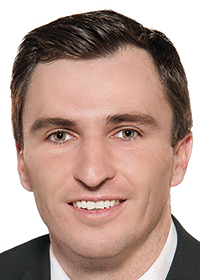Retirement is coming faster than you think
by May 19, 2021 11:09 am 852 views

Congratulations to the members of the Fast 15 class. Your accomplishments and leadership potential are equally remarkable. Much good work has been done in a relatively short time. As far into the future as it may seem, all of you surely want to retire someday and enjoy the fruits of your labor.
That’s why it’s important to remember that it’s never too early to start saving for retirement, even if many of your peers are not heeding that advice. In fact, according to one recent report, the median 401(k) balance for those ages 22-25 is barely more than $1,800, and the median balance for those ages 25-34 is about $10,400.
I commonly hear the same frustrations from clients in these age ranges who are trying to save for retirement. The frustration stems from the fact that they are often trying to pay off student debt, save to buy a home, plan a wedding, etc. That frustration is understandable, especially considering young professionals today must shoulder a more significant load of saving for retirement than previous generations, many of which had access to pension plans.
The good news for Fast 15 members and other young professionals is that time is on your side.
Now that pension plans largely have been replaced by 401(k)s and Individual Retirement Accounts (IRAs), it’s imperative you understand the complexities of these plans. Most young professionals I sit down with tell me their reluctance to invest in a defined contribution plan stems from the fact they have not received financial training on such matters.
While many young professionals seem to be off to a slower start in retirement savings than previous generations, there is plenty of time to catch up. When working with younger clients, I typically ask them to follow a few simple steps to build a strong financial foundation.
The best first step is to create a budget and statement of financial condition. A budget helps track where your money is going and what spending you may need to curb.
Creating a budget is a critical part of establishing a solid financial plan. The crux of a reasonable budget is discipline and accurate tracking. Without discipline and accurate tracking, a budget won’t be of much help.

Creating an emergency fund also is essential because it’s not if life happens, it’s when life happens. Far too often, I see young professionals without an adequate emergency fund to safeguard against unexpected events. A recent survey from the Federal Reserve noted that 40% of adults couldn’t cover a $400 emergency.
Without an emergency fund, people frequently resort to credit cards to pay for emergencies, which often compounds the problem. A good rule of thumb is to keep the equivalent of six months of fixed and variable expenses in liquid accounts for emergencies.
Finally, look to take advantage of retirement accounts early. With a solid budget and emergency fund intact, young professionals can focus on available retirement accounts. Retirement accounts such as 401(k)s and IRAs are powerful tools to grow long-term wealth.
Something I often see overlooked and misunderstood is the company match within 401(k)s. Investing in a retirement plan with a company match is a no-brainer. I tell my clients that when you’re not taking advantage of a company match, you’re simply leaving free money on the table.
Again, I understand young professionals have other pressing needs to worry about, like reducing debt and saving for those big life moments. But laying the groundwork for retirement sooner than later can help ensure you retire sooner and with more money to enjoy during the “golden years.”
Young people, including young professionals, are constantly encouraged to live life to the fullest. Just don’t forget that includes retirement.
Titus Laney is a senior client advisor for Arvest Wealth Management in Benton County. The opinions expressed are those of the author.
